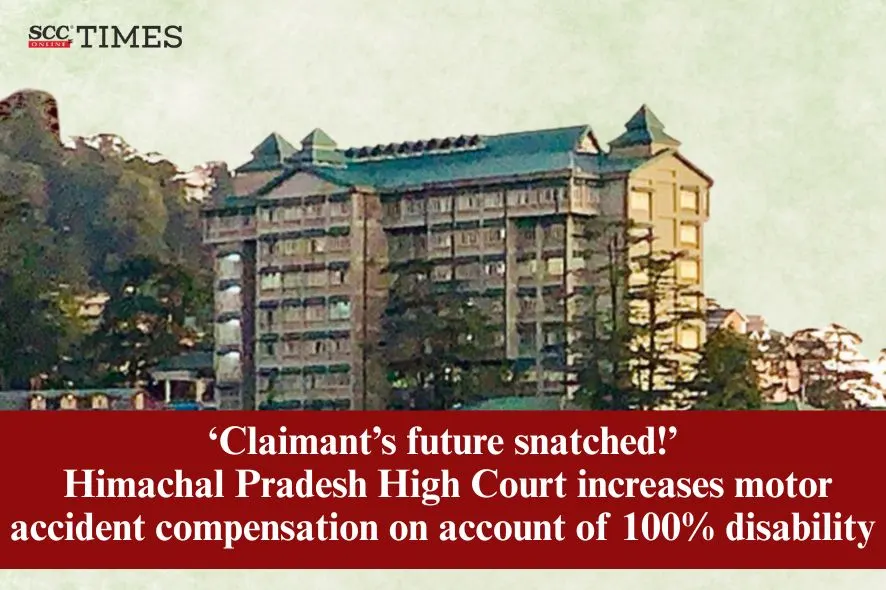Himachal Pradesh High Court: The present appeal was filed by Tata AIG General Insurance Co. Ltd. (‘insurer’) under Section 173 of the Motor Vehicles Act, 1988 (‘MV Act’), against the order dated 27-02-2018, passed by the Motor Accident Claims Tribunal (‘Tribunal’), wherein Respondent 1 (‘claimant’) was awarded approximately Rs 68 lakh in compensation on account of injuries and disablement sustained by him in a motor accident. The insurer contended that the amount of compensation awarded by the Tribunal was excessive. A Single Judge Bench of Satyen Vaidya, J., recalculated the compensation payable to the claimant and increased the amount to almost Rs 82 lakh keeping in mind that he would be spending the rest of his life lying on a cot or sitting on a chair.
Background:
On 14.11.2012 at 7.30 a.m., Respondent 2 (‘driver’), who owned the car, was driving on Nerwa to Lal Pani Road at Kalara when the vehicle went off the road and fell into a deep gorge because of which serious injuries were suffered by the claimant, which resulted in his 100 % disablement. The claimant was a student of 3rd year Civil Engineering course at Lovely Professional University, Jalandhar. However, after disablement, he could not complete his educational course and became totally dependent on others. The cause of the accident was attributed to the rash and negligent driving of the driver, who was none other than the claimant’s father. The claimant was diagnosed with a fracture of D-12 spine, which had caused complete paraplegia, and was treated in multiple hospitals remaining hospitalised for 119 days. The Medical Board certified the disability of claimant to be 100 per cent. The Tribunal awarded a compensation of Rs 67,88,000 along with interest of 7.5 per cent per annum from the date of filing of the petition till its realization.
The insurer assailed the award mainly on the ground that it was excessive and submitted that the claimant was still a student who was not earning, so his notional income of Rs 10,000, assessed by the Tribunal, was baseless and suggested that the minimum wages fixed under the Minimum Wages Act, 1948, should be taken as the fixed criteria which was approximately Rs 250 per day for a highly skilled worker in an Engineering Industry. It was also contended that the Tribunal erred in applying the multiplier of 44 while assessing the compensation on account of future attendant charges and medical expenses in future.
However, the claimant alleged that, given his condition, the compensation was not adequate and just. He submitted that being an Engineering student, he had prospects of a bright future and even after taking the most conservative approximation, an engineering graduate immediately after passing out, would not get a job with salary of less than Rs 10,000 per month.
Analysis and Decision:
The Court observed that the Tribunal’s decision regarding the cause of the accident, being the driver’s rash and negligent driving, needed no interference. The Court agreed with the Tribunal’s calculation of compensation under the heads of expenditure on medicine, hospitalization charges, transportation charges, and attendant charges incurred during hospitalization but modified the same for the following heads:
- Pain and suffering and shortened expectation of life — The Tribunal had awarded Rs 50,000 each on account of pain and suffering and expectation of life which the Court considered negligible keeping in view the health condition and future prospects of the claimant. The Court observed that his chances of a brilliant career, marriage and all other enjoyment of life had been snatched and though, no amount of money could compensate for such a loss, it did not mean that just and adequate compensation should not be awarded for the same.The Court, relying on Rekha Jain v. National Insurance Co. Ltd., (2013) 8 SCC 389, and Baby Sakshi Greola v. Manzoor Ahmad Simon, 2024 SCC OnLine SC 3692, held that an amount of Rs 20 lakh in lumpsum would be just and adequate compensation to the claimant under the heads pain and suffering and loss of expectancy at the rate of Rs 10 lakh under each head.
- Loss of earning and earning capacity — The Court referred to National Insurance Co. Ltd. v. Pranay Sethi, (2017) 16 SCC 680, wherein it was held that incremental increase on account of future prospects would be available even to those victims who did not have a permanent employment and in such cases, an incremental increase of 40 per cent was made admissible. Therefore, the Court decided that the claimant would also be entitled to the benefit, and his monthly salary would be Rs 14,000. The Tribunal’s multiplier of 19 was approved, thereby increasing the amount under this head to Rs 31,92,000.
- Future attendant charges and future medical expenses – The Court found the amount of Rs 6000 per month on account of attendant charges to be justified, but the amount of Rs 2000 per month for medication appeared to be less, given the claimant would have to remain bed-ridden and therefore increased the future medical expenses to Rs 4000 per month.
The insurer had challenged the multiplier of 44 used by the Tribunal for these two heads. The Court relied on Baby Sakshi Greola (supra) and held that a multiplier of more than 19 could not be allowed for assessing the compensation for future medical charges and the attendant charges thereby changing the amount to Rs 9,12,000 and Rs 13,68,000 respectively.
Therefore, based on the above analysis, the Court disposed of the appeal after modifying the compensation amount from Rs 67,88,000 to Rs 81,60,000, keeping the interest rate the same as awarded by the Tribunal.
[Tata AIG General Insurance Co. Ltd. v. Abhijeet Singh Thakur, 2025 SCC OnLine HP 3343, decided on 25-7-2025]
Advocates who appeared in this case :
For the Appellant: Jagdish Thakur, Advocate.
For the Respondents: Sunil Kumar, Pankaj, Sanjay Ranta, Advocates.


